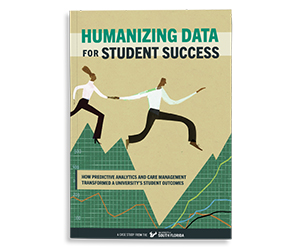In January of 2022, Sarah Marshall, an academic advocate at the University of South Florida, reached out to a sophomore student in danger of failing most of her courses. She was a first-generation college student from a single-parent household who had been placed on academic probation and was on the verge of being academically dismissed.
Over several months, Marshall connected the student with a variety of USF resources, including wellness support and study skills mentors, and spent time talking with her about how to more effectively communicate with her instructors to navigate options to improve her grades. Before long, things got better – much better. By the end of spring, the student passed all her courses and was removed from academic probation. She told Marshall it had been her best semester in college, and the first time she had been so successful in the classroom.
The student remains enrolled at USF, and she and Marshall continue to meet every two to three weeks to help keep her on track for timely graduation. Her story is complicated, fraught with personal challenges and family concerns that continue to impact her wellness. However, it is by no means unique. And it’s an example of why USF utilizes a data-informed case management model designed to provide an additional layer of outreach and support that ensures thousands of students each year receive proactive outreach from an academic advocate like Marshall.

The model is assisted by machine learning, a form of artificial intelligence, and is informed by practitioner insights. The result is a proactive tool to identify and prioritize students who may need intervention to avoid future academic trouble – in some cases before the student even realizes the extent of the problem and the potential consequences. And it’s part of a much larger, comprehensive, data-informed approach to student success that USF began using about a decade ago driven by an institutional expectation that every student will succeed when given the opportunity to do so.
That approach has been a driving force behind a decade-long improvement in overall outcomes, with first-year retention rates rising from 86 percent to 91.9 percent and four-year and six-year graduation rates climbing to 63.5 percent and 74.6 percent through the 2019-20 academic year. And while USF, like many universities, saw a leveling off during the COVID-19 pandemic amid unprecedented strains placed on students and staff alike, the model underscores the importance of human interaction as critical to student success in a post-COVID world.

Download the free case study to learn how USF:
- Created a proprietary predictive analytics platform to identify at-risk students
- Paired data-driven insights with a team of professionals dedicated to one-on-one student support
- Improved retention and graduation rates through a decade-long cultural transformation






